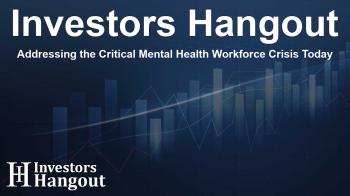Addressing the Critical Mental Health Workforce Crisis Today

Suicide Prevention Training for Mental Health Professionals
National Mental Health Corps Addresses Critical Need
Suicide continues to pose a significant threat to the well-being of communities across the nation, impacting countless lives each year. In a recent year, nearly 50,000 individuals lost their lives to suicide, with over 13 million contemplating such an act. Compounding this issue, an alarming number of individuals have attempted suicide, highlighting a pressing need for effective intervention and support. According to the Centers for Disease Control and Prevention, suicide ranks as the eleventh leading cause of death in the U.S., with alarming rates among youth and young adults.
The Importance of Suicide Prevention Training
Training for health professionals is crucial in addressing the gaps in knowledge surrounding suicide prevention. The American Foundation for Suicide Prevention underscores the necessity for such training, noting the substantial portion of mental health practitioners who lack proficiency in assessing and managing suicidal risks. Despite many professionals encountering individuals at risk, most do not receive adequate training in suicide prevention during their education. Notably, a stark survey revealed that more than half of mental health providers reported no previous suicide training.
Current State of Training
While there are various approaches to suicide prevention, including the prominent "Zero Suicide" framework, a lack of national standards exists regarding suicide prevention training. Currently, only a handful of states mandate training in suicide assessment and management for mental health professionals. Recent research has illustrated that suicide-specific training can significantly enhance care for individuals facing mental health challenges and increase provider competence.
Impact on Mental Health Professionals
Training also serves to support mental health providers themselves. The pressures of working with suicidal clients often lead to heightened stress and potential burnout among practitioners. Responsible training not only builds confidence and skills in providers but might also alleviate some of these pressures, ultimately fostering a healthier workforce.
National Mental Health Corps' Role
The National Mental Health Corps is at the forefront of addressing the crisis within the mental health workforce. This organization focuses on comprehensive training programs designed not only to prepare new practitioners but also to enhance the skills of existing professionals. By developing partnerships and resources, the National Mental Health Corps strives to ensure that communities have reliable access to well-trained mental health professionals.
Collaborations for Improved Training
To tackle the knowledge gap in suicide prevention, the National Mental Health Corps has partnered with renowned experts in the field. This collaboration has led to the creation of the Core Competency Model of Suicide Prevention training. This model emphasizes a multifaceted approach, focusing on enhancing knowledge, reducing stigma, and building necessary skills for effective intervention.
Rebranding and Commitment
The rebranding of Health360 and the Healthy Minds Alliance to the National Mental Health Corps signifies a renewed commitment to addressing mental health workforce issues. Founded with the goal of tackling workforce shortages, the organization is passionate about expanding access to mental health care throughout the communities it serves.
Joining the Movement
The National Mental Health Corps actively invites individuals and organizations to engage with its mission. By promoting awareness and participation, they hope to create a supportive network centered on improving mental health for all.
Frequently Asked Questions
What is the National Mental Health Corps?
The National Mental Health Corps is an organization focused on addressing the mental health workforce crisis by offering training and support to mental health professionals.
Why is suicide prevention training needed?
Suicide prevention training equips mental health professionals with essential skills and knowledge to effectively assess and manage the risks associated with suicide.
What is the Zero Suicide framework?
The Zero Suicide framework is an approach aimed at preventing suicide in health care systems, emphasizing comprehensive training and clinical practices.
How does the Core Competency Model facilitate training?
The Core Competency Model enhances the effectiveness of suicide prevention training by focusing on key skills and knowledge areas necessary for practitioners.
How can individuals get involved with National Mental Health Corps?
Individuals can engage by visiting their website and participating in social media conversations to raise awareness about mental health issues.
About The Author
Contact Lucas Young privately here. Or send an email with ATTN: Lucas Young as the subject to contact@investorshangout.com.
About Investors Hangout
Investors Hangout is a leading online stock forum for financial discussion and learning, offering a wide range of free tools and resources. It draws in traders of all levels, who exchange market knowledge, investigate trading tactics, and keep an eye on industry developments in real time. Featuring financial articles, stock message boards, quotes, charts, company profiles, and live news updates. Through cooperative learning and a wealth of informational resources, it helps users from novices creating their first portfolios to experts honing their techniques. Join Investors Hangout today: https://investorshangout.com/
The content of this article is based on factual, publicly available information and does not represent legal, financial, or investment advice. Investors Hangout does not offer financial advice, and the author is not a licensed financial advisor. Consult a qualified advisor before making any financial or investment decisions based on this article. This article should not be considered advice to purchase, sell, or hold any securities or other investments. If any of the material provided here is inaccurate, please contact us for corrections.

